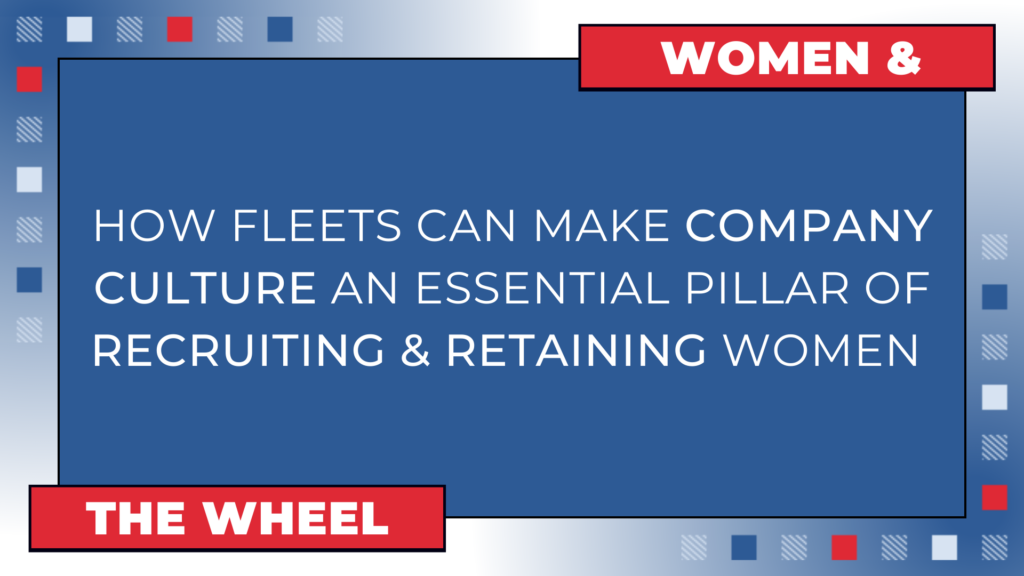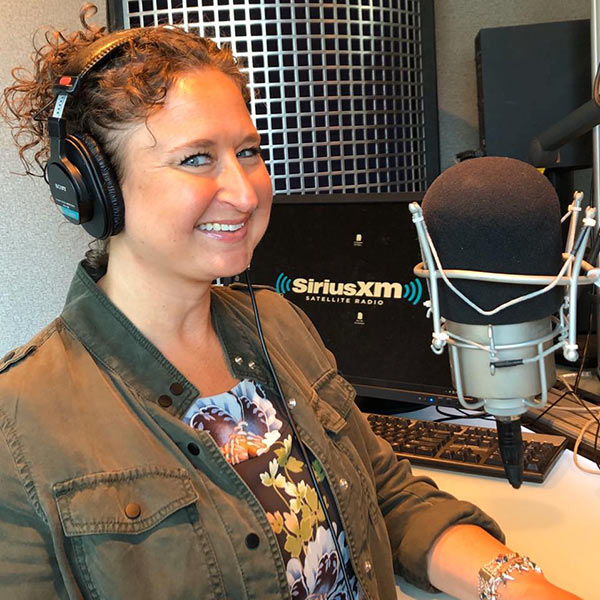This article is part of NTI’s month-long Women & The Wheel series, celebrating Women’s History Month by highlighting ways fleets and the industry can showcase trucking’s opportunities, implement policies to recruit and retain women, and recognize women excelling in transportation careers.
To effectively recruit and retain women into trucking – not only to driving jobs but at all levels throughout a fleet’s organization – creating a culture of inclusivity is critical.
A panel made up of female leaders and professional truck drivers spoke at length on this topic last week in the second annual Aim Women in Transportation panel. Moderated by Aim’s VP of Marketing Jessica Deane, the panel included NTI President & CEO Leah Shaver; Patty Durkin, Chief Human Resources Officer at Aim Transportation; Chelsea Coleman, Senior Corporate HR Manager at Olympic Steel; Angela Corpe, Transportation and Logistics Manager at Timken Steel; Lorie Miller, Customer Experience Director at Wincore Windows; Marilyn Suber, Transportation Advisor at Tenstreet; Bethany Sanchez, Regional Field Manager at Aim; Amanda Austin-DiMartines, a professional driver at Aim; and Susan Lindstrom, a professional driver for Aim.
Here are some of the highlights the speakers focused on about how companies can create a culture that attracts women to opportunities at your fleet — and helps keep them there as a long-term career choice. Also, catch the full replay in the video below.
To better connect women with jobs in trades, specifically becoming a professional truck driver, NTI’s Leah Shaver sees a three-pronged approach: spreading the word about trucking’s opportunities in your network and community; the power of mentorship for both experienced drivers and industry newcomers; and utilizing social media as an invaluable tool to connect with women across generational cohorts — particularly Gen X and Millennials, the latter of which is the largest cohort in the U.S. workforce, but is dramatically underrepresented in trucking.
“When you hear me talking about career path and working our way through the industry, a lot of that influence pertains specifically to the success we’re going to have in the near future of recruiting Millennials,” Shaver said.
NTI has found that, statistically, companies with the highest percentage of women in trucks have women in leadership roles. Female representation at the top has a trickle-down effect that, for many women, illustrates what a future in transpiration could look like.
“Women still face a variety of challenges working in the transportation industry,” said Bethany Sanchez. “One challenge being stereotypes, or old school thinking about females and transportation. I feel the main reason I have been successful in my position is the support from our management team at AIM. With out their mentoring, I would not have the vast knowledge in the industry that I do have. In my experience…having to prove yourself as a female, when it comes to my experience with driver management, drivers will test or question your knowledge and experience, but once you show them your accountability, you gain their trust.”
“I’ve seen our workforce change, since I’ve been here…in two different ways. Statistically speaking, we’ve added female board members, leadership positions, going back to what Leah said about starting at the top in those leadership positions, trickling down. And we’ve seen that in our production roles as well,” said Chelsea Coleman. She details how they are recruiting more women through company culture — such as focusing on policies that support working mothers.
“Over the last couple of years, we’ve really tried to be intentional about adjusting [policies], especially for working mothers. In transportation, we have to meet customer needs. But in the steel industry, we’ve also done some part time work, where they’re dropping their children off at school, then they come and work a four or five hour shift, then they go pick up their children. And they’ve been able to get into the steel industry.” She suggests other companies be intentional “about adjusting your policies procedures and reviewing where you need to.”
Marilyn Surber, a Transportation Advisor for Tenstreet detailed how resource groups, Facebook groups and clubs can offer women formal and informal settings to support each other in the workplace, adding that these things “just didn’t exist before, even just a couple of years ago, those things were not as prevalent. So I think that is a movement that has a lot of momentum.”
“We’ve seen companies start to pay more attention to how they’re attracting different types of talent into all different types of roles, but I do believe it has to start at the top,” Surber said. “So I think having female leadership is imperative, but I also think having strong men that are supporting strong women is equally as important. They’re featuring women in their ads, so you’re starting to see more women reflected.”
Safety is obviously a chief concern for women going into the truck driving profession. The panel touched on the tools that have been put in place to address safety concerns and how carriers can implement policies that protect women. For example, Surber suggested allowing women greater access to hotel stays as a safety policy, as well as having their shifts align with safer times to park and take their HOS breaks.
“Culture in general for women: it’s difficult. Hiring is expensive, [so] we want to make sure we retain people. So there’s a lot of things we’ve done with retention and culture, and [we’ve made] culture a strategy. Think of the golden rule — treat people how you want to be treated.” At Aim, culture includes open communication, pairing the right trainers with the right trainees, building a robust referral program, developing mentorship networks, providing a health compensation plan, and painting a picture of your company culture effectively on social media. “People are going to pick you by your culture.”
Women & The Wheel: A conversation during Women’s History Month


